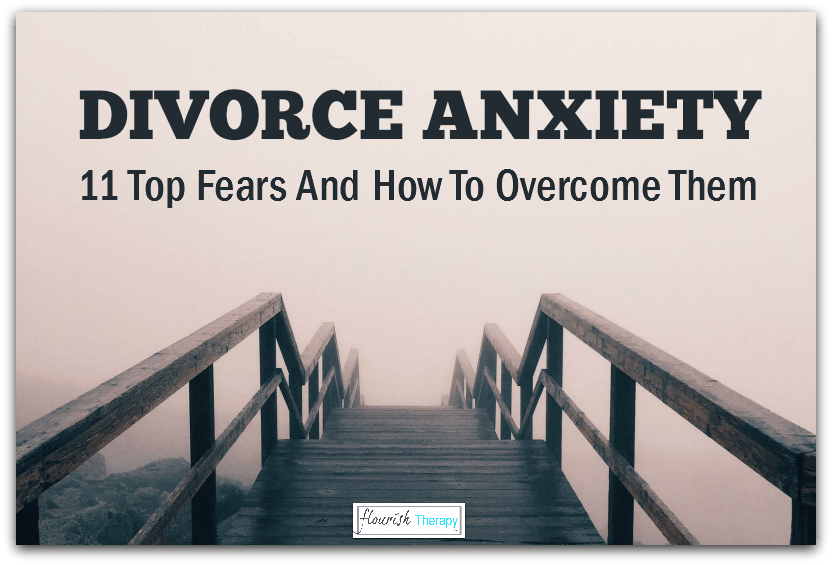Divorce Anxiety: 11 Top Fears and How to Overcome Them
Divorce Anxiety: 11 Top Fears and How to Overcome Them
Divorce anxiety is painfully real. When you’re considering a divorce, the rollercoaster ride of emotions you experience can leave you feeling confused, exhausted and paralysed with fear. I remember realising that my marriage was coming to an end. I would start to ponder various situations, re-live various experiences to try and retrieve something positive. Only to become lost in an emotional quagmire of what ifs and maybes, regrets, disappointments and feeling overwhelmed by the enormity of the chain of events that would follow those few words: “I can’t stay married to you any longer”.
When divorce is the only option
While I was stuck in the mire of fear and anxiety, I found comfort in the fact that I wasn’t the first wife about to leave her husband and become a single mum. I wouldn’t be the last either. I tried to reframe my divorce anxiety and look at my impending divorce as an experience that would make me grow as an individual. An opportunity to live life on my own terms, regain the sense of freedom that I had lost and live with the set of values dear to me. I considered the divorce a learning experience as well as a lifeline. I was beginning to feel my mental and physical health drain away from me. So, when the day arrived for me to take the plunge and admit my feelings to my husband, I was left with little choice.
Divorce anxiety and fear
Divorce anxiety and fear are two of the major emotions you are likely to experience when going through a divorce, even when it’s you that’s driving the divorce. The prospect of change can be anxiety-provoking and when considering a divorce, change is affected on every important aspect of your life: your children, your home, your finances, your in-laws, your own family, your mutual friends, possibly even down to who gets the pets. Only to be further underlined by the prospect of dating again, the fear of being alone, the fear of being socially side-lined, the fear of managing financially. The fear of wondering if you can actually do it.
“A heart can stop beating for a while, one can still live.” Suzanne Finnamore, Split: A Memoir of Divorce
Optimism or pessimism?
Divorce represents the end of a union. It’s important to remember that we always have a choice as to how we allow something to affect us. While you may feel hemmed in by your negative emotions, remember that divorce does not need to be a terrible experience. Viewed positively, divorce anxiety can be reframed into a freeing experience. Divorce can be empowering. Divorce can offer you both new beginnings. Yes, there will be some bumps in the road ahead as you are both navigating an emotional path which can leave you feeling vulnerable and raw as well as defensive and afraid. Yet there are also positives you can focus on to help you make your way forward.
Divorce anxiety is debilitating. Below are 11 of the main problems associated with divorce and strategies to help you overcome them.
1. Divorce anxiety about your children
If you have young children, you will both need to remain fair and objective about how you are going to help them cope with your split. Avoid arguing in front of them. If your partner won’t back down and insists on arguing in front of the children, be the one who turns around and walks away. Try and diffuse the situation as much as possible. If your partner becomes violent towards you, you need to involve the police. The safety of you and your children is of paramount importance. It is not their fault that your marriage is coming to an end and they will need to be shielded from the negativity of the divorce.
Avoid belittling your partner
Your children will need two sensible and stable parents who they can trust to look after them correctly. Don’t say negative things about the other parent in front of them. It might make you feel better, but it will hurt the children and what’s more, it’s not fair. Despite your misgivings about your partner, they love both of you. When you talk negatively about each other in front of them, by extension, young children will perceive you as speaking negatively about them too. So just don’t do it. It’s not necessary and you will only end up hurting them. When you do need to sound off about your partner, do it to a trusted friend who will maintain your confidentiality.
Put children’s needs above your own
Make sure to consider the children’s needs above your own. Young children will not be ready to suddenly spend long periods of their time apart from their main caregiver. Just because you are their father or mother doesn’t give you “the moral right” to have them when you want. They need to be willing too. Give them the time they need to adjust at their own speed. If it takes two or three years until they are happy to spend a weekend away from their main caregiver, allow them that time. Until then, make the time that you do spend with them extra special and fun. You’ll soon have them wanting to sleep over and spend more time with you.
When they feel safe and secure, it will come naturally. Most importantly, you don’t want to be the parent that the children remember negatively when they’re old enough to make their own decisions and have their own opinions. Ultimately, forcing your will upon them when they’re not ready for it will back-fire on you.
Strategies to cope with their loss
If you’re finding that you are missing them terribly, consider writing a diary about your dreams and plans for them. You could create a journal that you could present to them on their 18th birthday or other milestone. Get creative. Find old photos of you and them. Photograph trips that you make together and keep a record of cinema tickets, theatre tickets and any other reference you have of things you’ve done with your children. Write poems about them. Include letters and notes they have written to you. Press flowers that remind you of them.
It won’t replace their absence in your life, but it will help you come to terms with not “living” with them anymore and will give you a project to work upon. What’s more it’s about the best present you could ever gift to anyone. It will have your love all over it and will be a testament to your deep affection of them.
Get to know your emotions
Make sure you rely on trusted friends who can help you overcome your divorce anxiety surrounding your children. Share your concerns and fears. Talking will help you to work out exactly what aspect of not seeing your children as regularly as you did while you were married is hurting you the most.
Jealousy
When I ask my clients this question, sometimes they feel jealous that the main caregiver is spending more time with the children than them. Jealousy is an emotion that only serves to hurt you further. If jealousy is an aspect of your divorce that is causing you problems, consider getting professional help to overcome it.
“If you spend your time hoping someone will suffer the consequences for what they did to your heart, then you’re allowing them to hurt you a second time in your mind.” Shannon L. Alder – 300 Questions To Ask Your Parents
Anger
Anger is another common emotion associated with divorce. Negative emotions such as anger will eat away at your energy. That you are no longer in control of aspects of your life hurts. Anger can be because your partner is forcing you down a road you don’t want to travel. You feel angry having to financially support someone who is hurting you so much. Remember that you are ever only in control of yourself. No matter how hard you try to control other people, all you will do is waste your energy. Remember also, that alimony / maintenance payments are put into effect because generally one half of the marriage has foregone a successful career to enable the other party to be the main breadwinner.
Oftentimes we don’t realise how angry we feel, we just have a sense of frustrated fizzing brewing beneath the surface. Again, talking to a trusted friend or experienced therapist will help you decipher your angry feelings and give you specific strategies to help you overcome them.
“When you stop resisting, you encourage delightfully unexpected surprises into your life.” Kate Hartley
Myth busting
Consider also, that staying together for the sake of the children is a myth. Children aren’t stupid. Even if you don’t argue in front of your children, they will pick up on the energy between you. Do you want your children to grow up thinking that your unloving and possibly disrespectful relationship towards each other is normal? It could lead them to repeat the behaviour they’ve grown up witnessing. If you don’t love each other, go your separate ways.
Children are far happier when they know you are happy too. Children are also extremely resilient. Let them talk and air their emotions when they need to. Create space for them to work their way through the divorce. When they feel their emotions are respected and valued, it will give them a sense of security.
Where possible maintain family routines to help your children feel more secure. If you know of friends going through a similar situation, try and meet up so that your and their children can get to know each other. Knowing they are not alone can go a long way to reducing their divorce anxiety and making them feel more normal.
2. Will you lose your home?
Divorce often means having to sell the marital home so that monies can be shared out proportionately. If you’re very lucky, you may be able to stay in the marital home with the children which will mean less upheaval for all of you, but this is rare. Divorce will mean some level of sacrifice. Ultimately, is staying in the marital home crucial to your mental health? Probably not. While we may love our marital home and have fond memories attached to it, if finances dictate, it will need to be sold. Don’t let divorce anxiety keep you stuck wanting something you simply can’t have. Start working out what you can afford to buy or rent and see it as a new adventure. You gain nothing by wallowing in self-pity and wishing that things could be different. Divorce is a time of new action and fresh beginnings.
3. Where will you live?
Work out where you need to look for a new home. If you are a parent, you will need to consider proximity to the children’s school. Also if the children are young and the non-resident parent is involved in their lives, you will need to consider how close to each other you are going to live so that the children can see you both regularly. If your support network lives at the other end of the country, you will need to work out how you can help facilitate contact with the non-resident parent, possibly by hiring a chaperone to accompany your children on long trips, or agreeing for the non-resident parent an extra night with the children to allow for long distance travel.
Moving abroad
While the non-resident parent cannot dictate where you live geographically, if you plan to move the children out of the country, you will most likely need the agreement of a judge to do so. The court will weigh up the reasons why you need to move out of the country against the importance for the children to have on-going contact with the non-resident parent. Bear in mind that contact with the non-resident parent carries a lot of weight.
If you really plan on emigrating, you may have to delay your plans until the children are old enough to have their own opinion about it and be willing to make the move. In the UK, children are considered to have a legal voice at the age of 10 and over. In the US it varies between States. In California, it is age 14 and above. Under the age of 14 it is up to the judge to decide.
4. How will I manage financially?
Divorce generally entails financial hardship. Financial concerns tend to rank at the top of all divorce anxiety issues. If you know divorce is imminent there are a few things you can do to soften the financial blow:
Bank accounts
- If your bank accounts are shared, put an alert on any transaction over £500 / $500 just in case your partner tries to shift money around without your knowledge.
- If possible, before you split up, close all joint bank accounts. You don’t want an angry partner running up bills that you may also be liable to repay. If you can’t come to an agreement about your bank accounts, consider asking your bank to freeze the accounts temporarily. Then once the divorce is finalised the court will decide who should be liable to pay off the debt. If your partner refuses to pay the debt, it won’t affect your own credit score and is no longer your problem.
- Go through your bank statements, no matter how scary a job this might be. Once you know what your monthly outgoings are, you’ll be able to plan ahead knowing what income you need to bring in every month. You will need this information for when you complete Form E of your divorce papers. If you end up in court, the judge will need to know what your monthly requirements are.
Financial planning
- If you don’t understand your partner’s financial dealings, consider hiring a forensic accountant who will clarify what investments are where and how much they are worth.
- Start saving to help cover you for a few months post-divorce to help to keep you going.
- Work out what you owe and what you own. You will need to know the value of all your assets and liabilities. Start gathering proof of income – yours and your partners.
- If you don’t own your own credit card, get yourself one but use it wisely. If you’ve always shared a credit card with your partner, you will need to start to build up your own good credit score. Having a good credit score will make it easier for you to take out loans, sign up for monthly payment plans etc. Start making a few purchases a month and make sure you pay off the balance every month.
- Learn to be thrifty. Give up the non-essential stuff and focus on saving whatever you can. You don’t need to commit yourself to a life of continued thrift and simplicity, but financial wastage isn’t going to help you. Learning how to be thrifty is extremely freeing too. We surround ourselves with so much junk and unnecessary clutter. Use your divorce as an exercise to pare down some of your belongings. Go minimal for a while and see how relaxing and refreshing it can be.
- Confide in friends and family. You don’t need to tell everyone about your marital difficulties, but by having a few trusted allies on board, if your boat starts to sink, you can reach out for financial or emotional support. Trust me, you’ll need a friendly smile every now and again.
5. Losing your in-laws
Despite the old jokes about mother-in-laws, some of them totally rock. Divorce is a difficult time for your in-laws. They may feel very affectionately about you too and of course, if you have children, they are still grandparents to those children and have a right to be involved in your children’s lives.
If you have a good relationship with your in-laws, be respectful of their relationship with your partner. They will need space to be able to support their offspring. Now is not the time to be garnering their favour. With time, the dust will settle and if you’ve enjoyed a stable and positive relationship with them in the past, it’s likely that will continue once the divorce proceedings have come to an end.
6. Your parents and your ex
Remember that your parents may also have formed a bond of love and trust with your soon-to-be ex. Be clear and fair with your parents when conversing with them about your divorce. It’s important that they are there to support you emotionally, and possibly financially, while you sort yourself out. Your parents will suffer their own divorce anxiety about you. Allow them the space to come to terms with your break up in their own time. If they want to remain in touch with your ex-partner, allow it. You can’t prevent it in any case. It doesn’t mean they love you any less.
7. Trusted friends
Sometimes, we just need a bolt-hole where we know we’re welcome at any time of the night and day. It’s a strange phenomenon, but when you get divorced you may find that some of your friends distancing themselves from you. I’m not sure if it’s because you no longer fit comfortably at the dinner-party table as you’re just a singleton, or whether they have some innate fear that you’re going to run off with their spouse.
Whatever the reasons, don’t be surprised if you find this happening to you. Try not to take it personally. It says a lot more about them than it does about you. Instead, focus on the friends who are offering you support and allow them to help you. Divorce can be a lonely old time and there will be moments when having a trusting, smiling face, a warmly delivered hug and a shared bowl of soup can help you to see the silver lining of the emotional chaos you find yourself caught up in.
8. Who gets the pets
As an animal lover, I couldn’t possibly consider being without my beloved pets. Sometimes we may bring our own pet into the marriage and it’s a logical decision to take that pet with you when you divorce. However, when you buy pets jointly, you need to sit down and work out sensibly, who can give the pet the best home and love. Pets need company, dogs especially. What’s more, this may also affect the pet that was brought into the marriage by one partner, but has been cared for by the other half. Whoever ends up being the main caregiver for the children should probably assume the ongoing care of the pet(s) too.
The children will also need to have regular contact with their furry friends. Don’t underestimate the affection a child holds for a pet. They may grieve the pet more than the parent, so beware of forcing their separation from their beloved animals.
9. Costs of divorce vs costs to your health
There is no doubt that divorce is expensive, so is selling and moving home. But what’s the cost to your health if you stay stuck in a bad marriage? What negative impact is your failing relationship having on your children? Do you want them to grow up thinking your unloving relationship is normal of married life? Even when children recognise dysfunctional behaviour, because it’s what they’ve grown used to, they will often go on to repeat similar patterns themselves. Do you want that kind of a future for your own offspring?
10. Communication is key
If I can offer one word of advice it’s to try and remain friends to each other. At the very least, communicate with each other. It may be difficult at times, especially when one or both of you is hurting and you are being forced to deal with contentious issues like children, finance and support. Get good legal advice, but beware that there are many legals out there who like to stoke the flames of acrimony, so choose wisely. If you have children, choose a lawyer who specialises in family law. He or she will make sure the children’s best interests are served and will help you to make the right decisions.
If communication breaks down in the early stages, consider hiring a mediator who will be able to act as a third party. A mediator helps you work together to reach an agreement and can save you a lot of money if you can agree on the framework of your divorce. Once you’ve agreed on your framework, have your own legal representative check it over.
“Communication to a relationship is like oxygen to life. Without it … it dies.” Tony Gaskins
11. Self-care
Divorce anxiety has the knack of draining our energy and leaving us feeling lacklustre, overwhelmed and desperate. Make sure you prioritise your own health, both emotional and physical. In good health, you will be preparing yourself in the best way possible to successfully manage the coming months. You don’t want to regret the decisions you make because they will impact a large proportion of your future life. Let friends support you. Eat well, avoid drinking too much alcohol and try and prioritise good sleep. You’ll need your brain functioning as well as possible and a well fed, hydrated and rested brain will serve you much better than the frazzled alternative.
Importantly, take regular exercise – not only will it make you feel better about yourself and help you sleep more deeply, it is one of the best stress-busters known to man. Furthermore, get out in nature every day for a minimum of 20 minutes. Get the sun on your face and if the weather is bad, dress appropriately and blow the cobwebs away. Being outside has myriad health benefits and will help to support you during the difficult times ahead.
Lastly, have faith in the process. Eventually all the stress and decision-making will be over. Divorce anxiety will be a thing of the past. You will be able to wake up with a sense of freedom, empowerment and know that you have taken the necessary action to start to live life on your own terms.
If you’re considering divorce, what’s stopping you making that decision? What are the major challenges you are facing through your divorce? Do you have special ways of coping with them?
“When I let go of what I am, I become what I might be.” Lao Tzu – Tao Te Ching

























